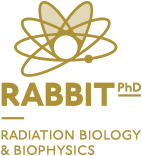Daniela Penas da Silva

PhD Degree in Radiation Biology and Biophysics
p110068@campus.fct.unl.pt
Research Areas
PhD Thesis: “Structural and mechanistic studies of mini-ferritin particles" (2014-2018)
Advisers: Prof.ª Doutora Alice Pereira and Prof. Doutor Pedro Tavares
Iron is an essential micronutrient for most organisms, important for oxygen transport, electron transfer, and DNA synthesis. At physiological conditions its insolubility and reactivity lead to problems of poor availability and toxicity, since iron can contribute for reactive species of oxygen. To provide sufficient quantities of iron and maintaining it in a nontoxic state, cells use a specialized mechanism for its acquisition, transport and storage that uses a superfamily of proteins commonly known as ferritins.
Ferritins are observed in the three kingdoms of life that oxidize (by oxygen or hydrogen peroxide) and store iron in a solid mineral ferric core. In fact, there are three ferritin families identified to date: the classical ferritins (Ftn), the heme-containing bacterioferritins (Bfr) and the Dps (DNA-binding protein from starved cells) proteins.
All ferritin families share storage and detoxification capabilities, nevertheless, the Dps family has the peculiarity of forming stable complexes with DNA. Moreover, Dps
Proteins are a hollow spherical protein constituted by 12 identical subunits, instead 24 subunits, thereby called mini-ferritins. These proteins can store up 500 iron atoms per shell, and due to their smaller and stable structure they can be used as a template for metal-oxide particle growth with very specific sizes, whose applications can vary from medicine to biotechnology.
In this PhD plan I aim to characterize the metal incorporation in aerobic and anaerobic conditions, the products of this metal oxidation reaction, and the core release functionalities. Also, I want to understand how the binding to DNA is regulated and evaluate the cellular growth resistance under stressing conditions.



